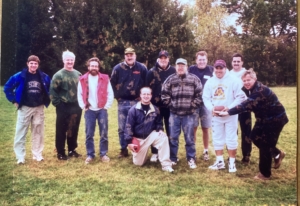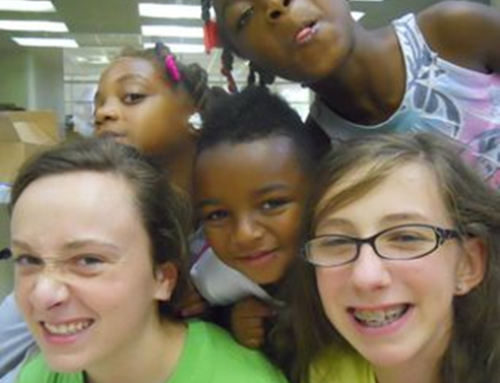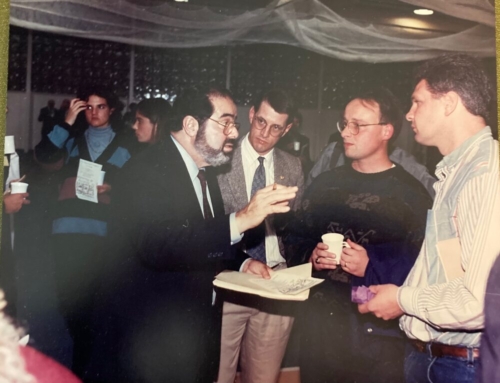The River Babies Journey isn’t merely about discovering the source of the river rabies. It’s also about finding our true selves. That’s because it is a journey, not a destination.
 This journey is nothing, if not a spiritual one. The main goal of everyone’s life journey is to become a better human. For Christians, this means being transformed into the image of Christ (2 Cor. 3:18). We are all saddled with character defects: that’s what it means to be human. Because the world is full of humans, the world is full of social problems. I share the following story to illustrate how I see that God has guided Kris and me on our journey thus far. When God leads us on His path, unlikely doors open. God’s path is a two-lane path: He guides us to places where we can have a tremendous impact in a hurting world, while at the same time experiencing profound personal transformation. When we moved back to Kris’ hometown, we believed we had arrived at our final destination. We would raise our family just a few blocks from Kris’ folks. We arrived in Bettendorf wounded and disillusioned. I was a retired minister at the age of 27. I still needed employment, so I began working in the financial service industry.
This journey is nothing, if not a spiritual one. The main goal of everyone’s life journey is to become a better human. For Christians, this means being transformed into the image of Christ (2 Cor. 3:18). We are all saddled with character defects: that’s what it means to be human. Because the world is full of humans, the world is full of social problems. I share the following story to illustrate how I see that God has guided Kris and me on our journey thus far. When God leads us on His path, unlikely doors open. God’s path is a two-lane path: He guides us to places where we can have a tremendous impact in a hurting world, while at the same time experiencing profound personal transformation. When we moved back to Kris’ hometown, we believed we had arrived at our final destination. We would raise our family just a few blocks from Kris’ folks. We arrived in Bettendorf wounded and disillusioned. I was a retired minister at the age of 27. I still needed employment, so I began working in the financial service industry.
Providentially, I was led to a financial planning firm owned by a committed Christian, Jeff, who took a particular interest in me; not just as a producing agent, but as a person. Seeing my bent towards research, Jeff had me research investment products, insurance, and corporate retirement plans for the firm to sell. Jeff told me that finding the perfect financial product was important, but that it was even more important to understand people’s needs and desires. He encouraged me to listen to people’s goals, dreams and fears. He told me that people don’t want the perfect product — they want the right product for them; and if I didn’t listen to my clients, I wouldn’t understand my client’s real needs, and I would be solving the wrong financial problems. Even today, I continue to ponder Jeff’s lessons on listening to others and having a healthy curiosity about them. That lesson helped me to see that there is key difference between knowledge and wisdom. Knowledge is about knowing a particular fact. Wisdom, on the other hand, has a relational component. It’s understanding how a particular truth applies in a specific situation and requires that we also know and care about the people involved. When we understand the other people, we will know when, how, or whether to connect those people to a particular piece of information. Wisdom understands that the how is even more important than the what. While in Iowa, we attended Homewood Evangelical Free Church.
Our plan was to sit on the back pew and beeline straight to our car immediately following the benediction every Sunday. The pastor and associate pastor, however, took a keen interest in Kris and me. Soon, Kris was teaching a children’s Sunday school class. Then a friend at church got her involved in a Wednesday night children’s program called AWANA. A little while later, Kris led a team that started Mothers of Pre-Schoolers (MOPS) at the church. I, on the other hand, was much more reticent.
My bad church experience in New York left me with self-doubt. Dave, the associate pastor, repeatedly asked me to teach an adult Sunday School class, and I repeatedly turned him down. One day, as Dave was getting to go on a two-week vacation, he asked me if I would teach his class while he was gone. I reluctantly agreed. The class went well. When Dave got back, he told me he wouldn’t be teaching his adult Sunday School classes any more. He had other priorities he needed to work on at church. His class was now my class. One year later, not only had the class outgrown our room, but I also was thoroughly enjoying leading it. At about the same time, the senior pastor, Rich, had been asking me to serve on the church’s elder board. He finally wore me down. Serving as an elder, I was able to see how Pastor Rich wisely handled delicate situations that were similar to ones that I had bungled as a young pastor. I watched him as he slowly and deliberately worked with people. I was also able to observe how Rich patiently built consensus on the elder board and on ministry teams. For him, getting consensus was more important than starting the project. Watching him, I learned and grew. As I got more involved in church work, my soul’s embers began to be rekindled for ministry. I began to ponder going back to school to earn a doctorate in New Testament studies. I narrowed my search to two seminaries: Marquette University in Milwaukee and Garrett Evangelical Seminary in Evanston, Illinois. Our plan was for me to get on staff at a church in the Milwaukee-Chicago area, and after getting settled down, work on my Ph.D. as a part-time student.
I ran the idea past several friends and mentors. Pastor Rich supported our idea and affirmed our call to ministry. He told us that he would do all he could to help us find a ministry position. Being from Racine, he had an extensive pastoral network around the Milwaukee area. Pastor Dave had been encouraging me to get back into ministry ever since we started attending Homewood. His response was basically, “What took you so long?” We knew that it would likely take a while to find the right opportunity. Our search constraints were pretty tight, and honestly unrealistic. We were looking for an associate pastor position that would be within 60 miles of Milwaukee and/or Chicago. The church would need to be willing to hire someone who had been out of pastoral ministry for nearly a decade. The church would also have to allow me to go to part-time after three or four years so I could begin working on my Ph.D. When you are on God’s path, however, the miraculous happens. Kris experienced our first miracle. Kris had taken our daughter Gloria out for a day at the children’s museum. While she was there, she bumped into a young mom who had just moved to Bettendorf from Antioch, Illinois. This young lady had led a MOPs group there, just like Kris was doing in Bettendorf. That commonality immediately piqued Kris’ interest. As they were talking, something began to stir in Kris’ heart. She decided that she had to follow up on this conversation. Kris sensed this accidental meeting was more of a divine appointment. She looked up Antioch, Illinois up on a map. It was exactly midway between Milwaukee and Chicago. Kris called the church that afternoon. She talked to the church secretary, Jeannie. She told Jeannie that we felt led to move into that area of the country. After chatting for a little while, Jeannie asked Kris what I did for a living. Kris told her we were looking for an associate pastor position in that part of the country. Jeannie told Kris that their church was about to start looking for an associate pastor. As they were talking, Jeannie said, “Here is the senior Pastor now. He’s walking in the door. Why don’t you talk to him about the position?” Kris proceeded to talk to the pastor of Antioch Evangelical Free Church. When I came home that day, Kris said, “John, I found our next ministry position.” Before she even told me her story, by the tone of her voice and the look in her eye, I knew that she had. So, I said, “Great job, Kris! Where is it?’ Then she told me the story.
When I spoke to pastor Rich about Kris’ conversation, he told me he had gone to seminary with the pastor in Antioch. In fact, that pastor had actually worked for Rich’s father-in-law’s company while attending seminary. He knew him well. Rich told me he would give that pastor a call. Suddenly, we are on the fast track to being an associate pastor in Antioch, Illinois. Within three months of Kris’ conversation, I had interviewed and I was hired as an associate pastor. The price of homes in the suburbs of Chicago and Milwaukee were much more expensive than Bettendorf, Iowa. This made finding one suitable for a family with four children a formidable challenge. Most of the homes that were in our price range were “fixer uppers.” On our first house-hunting trip, of all the homes we had looked at, only one made sense for our family. This home was in Wisconsin, 6 miles north of the church. It had a five-acre adjacent lot. The listing stated the lot was optional — the sellers were willing to sell the lot and home separately. We put a bid on the house, but not the adjacent lot. The next day the real estate agent called to tell me the sellers had changed their minds. If we wanted to buy the house, we would also have to buy the lot. Apparently, the sellers were trying to take advantage of our sense of urgency. They must have thought they had us over a barrel. I knew that doesn’t God work that way. Having no peace about this transaction, I told the agent, “No, absolutely not. Not only are we not countering their offer, we are withdrawing our initial offer.” I had no interest in buying from that seller. Perplexed, the agent said, “No? What do you mean, ‘no.’ You have seen all the houses on the market. I showed you every house that was within your price range.” I told him we would come back in two weeks and look at some more houses. “John, you have seen all the houses,” he replied. I said, “Do you want to be my real estate agent or not? Increase our price range by $10,000. We will be back in two weeks.” When we came back, there were only one or two additional houses to look at. He also took us to one or two homes that we had seen before. Kris and I were both, meh. Then he said, “I have a friend who is a real estate agent. He is putting his house on the market tomorrow. I will give him a call and see if he will let us see his house tonight.” It was a three-year old modular home, right on Cross Lake in Trevor Wisconsin. It was right on the Wisconsin-Illinois border, less than a mile from the church. It had a private beach for its residents. We put a bid on it that night, $5,000 under his asking price. The owner accepted our bid. The very next day, the owner received five sight-unseen bids on the house: most of them $5,000 – $10,000 over his asking price. Somehow, in a hot real estate market, that house was ours. It was closer to work, newer, and nicer than the first house we bid on: nothing short of miraculous.
 There were several other miraculous events that occurred during this transition, too many to recount here. During our move to Antioch, we learned that when you are on God’s path, we will regularly observe many very improbable “coincidences.” These “coincidences” provide assurance in our souls of being on His path. Kris and I call these improbable coincidences “altars.” In Genesis, after Jacob wrestled with the Angel of the Lord, he built an altar as an historical marker to memorialize that he had met God in that place. After Joshua and the people of Israel crossed the Jordan River, while the waters were at flood stage, he also built an altar next to the river as a monument to mark the place that God had stopped the flood waters in order for them to cross to the other side. Kris and I created mental altars and periodically recount those events to each other. Kris and I see our Antioch “altars” as reminders of how God showed up for us in our past and God’s implied promise of His continued guidance and presence in the future. Our experience in Antioch was as blessed as it was brief. There, I was able to put into practice the things that Jeff and Rich had taught me. There, for the first time, I built ministry teams. With a team of relationally wise and spiritually passionate small group coaches, we grew a small group ministry from 3 small groups to over 20. The same was true for men’s ministry. With a team of dedicated men, we were able to build a vibrant men’s ministry from scratch. The men’s leadership team decided it would be a good idea to get all the men together monthly, so we offered a monthly men’s breakfast. Our breakfasts became a marquis event at the church. The breakfasts also became a launching pad for our men’s small groups.
There were several other miraculous events that occurred during this transition, too many to recount here. During our move to Antioch, we learned that when you are on God’s path, we will regularly observe many very improbable “coincidences.” These “coincidences” provide assurance in our souls of being on His path. Kris and I call these improbable coincidences “altars.” In Genesis, after Jacob wrestled with the Angel of the Lord, he built an altar as an historical marker to memorialize that he had met God in that place. After Joshua and the people of Israel crossed the Jordan River, while the waters were at flood stage, he also built an altar next to the river as a monument to mark the place that God had stopped the flood waters in order for them to cross to the other side. Kris and I created mental altars and periodically recount those events to each other. Kris and I see our Antioch “altars” as reminders of how God showed up for us in our past and God’s implied promise of His continued guidance and presence in the future. Our experience in Antioch was as blessed as it was brief. There, I was able to put into practice the things that Jeff and Rich had taught me. There, for the first time, I built ministry teams. With a team of relationally wise and spiritually passionate small group coaches, we grew a small group ministry from 3 small groups to over 20. The same was true for men’s ministry. With a team of dedicated men, we were able to build a vibrant men’s ministry from scratch. The men’s leadership team decided it would be a good idea to get all the men together monthly, so we offered a monthly men’s breakfast. Our breakfasts became a marquis event at the church. The breakfasts also became a launching pad for our men’s small groups.
The men’s ministry team became a leadership engine at the church. Most of the church’s new elders and new ministry leaders came from our men’s ministry team. The development of leaders was more about the type of people God was bringing to our church than anything I did. The Chicago, Milwaukee area is a very transient community. People are always moving in or out of the community because of work. During our time there, God brought very talented men with tremendous untapped leadership potential. All we had to do was identify them, and involve them, and coach them. They did the rest. And as I worked alongside these men who were passionate about their relationship with God and passionate about becoming better dads and husbands, I too grew spiritually and became a better husband and father. While writing this article, Phil, a men’s ministry leader from Antioch called me out of the blue. I hadn’t talked to Phil in nearly two decades. He called to tell me that Antioch was a spiritual watershed in his life. He had recently retired and moved to Fort Myers, Florida. While there, he entered a new phase of his journey. He began to engage the marginalized in his city (a subject men’s ministry did not address while we were in Antioch). His main reason for calling, to tell me that he was participating in a new church plant there and that the pastor there asked him to be an elder at his church. He believed his time at Antioch had helped prepare him for that moment. I was honored that I was part of his spiritual journey, and on the other side of the path, Phil had inspired and encouraged me on my journey as well. While we were in Antioch, Kris became the children’s pastor. Instead of continuing the traditional children’s Sunday School and Children’s church, she developed a new ministry. She recruited several volunteers who had worked with the children at the church for years. She cast a vision of a large group/small group Children’s program, called “Live Wires.” Everyone worked together to create a new, high energy children’s ministry. The traditional Sunday school model had been attracting 40 to 50 children.
During the next few years, “Live Wires” doubled the children in attendance to nearly 100. Kris also developed a women’s ministry program that they called “Sister Act.” In Antioch, Kris wasn’t just along for the ride on my journey, she was on a fantastic journey herself. At Antioch, Kris and I learned a few things about being on God’ path. One thing we learned was to ask, “What is God dreaming?” This requires that we learn to see the world with God’s heart and God’s eyes. In starting Live Wires in Antioch, Kris asked, “What does God want to do in children’s lives and what do these children need? When we tap into God’s dreams, we experience inexplicable growth. This type of growth is the result of what I call a “divine convergence.” Before God acts, he invisibly prepares many things well in advance of His visible action. Years in advance, God has been preparing people’s hearts, preparing the context, and preparing us. Then, when we step on His path, we unlock the power of God’s preparation in an instant. It appears to be an instantaneous miracle, but the reality is that that particular moment was years in the making. When we are on God’s path, we arrive at the right place at the right time — the stars align and miracles happen. Only God knows where the path is that will take you to His point of convergence. We can’t create this moment. We discover His path. We can’t make things happen. We discover and walk on His path In our divine moment, God brings us to the place where we impact the world, while at the same time, we ourselves are transformed. Antioch wasn’t our final destination. I never did go to Marquette, but God used Marquette to direct me to his path. In Antioch, we learned, we grew, but most importantly, God had transformed us in a crucial way to prepare us for the next leg of our journey on His path.





